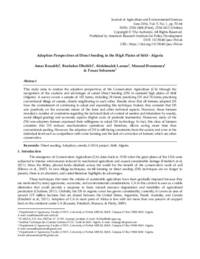Adoption Perspectives of Direct Seeding in the High Plains of Sétif - Algeria

Authors:
This study aims to analyze the adoption perspectives of the Conservation Agriculture (CA) through the
recognition of the cautions and advantages of cereal Direct Seeding (DS) in semiarid high plains of Sétif
(Algeria). A survey covers a sample of 102 farms, including 28 farms practicing DS and 74 farms practicing
conventional tillage of cereals, closely neighboring to each other. Results show that all farmers adopted DS
have the commitment of continuing to adopt and expanding this technique. Indeed, they consider that DS
acts positively on the economic return of the farm and other technical aspects. However, those farmers
revealed a number of constraints regarding the technical (lack of control of seeders and infestation by weeds),
social (illegal grazing) and economic aspects (higher costs of pesticide treatments). Moreover, many of the
(74) non-adopters farmers expressed their willingness to adopt DS technology. In fact, this class of farmers
considers that DS reduces mechanization operations and therefore, allows saving more time than
conventional seeding. However, the adoption of DS is still facing constraints from the society and even at the
individual level such as competition with ovine farming and the lack of conviction of farmers which are often
conservative
